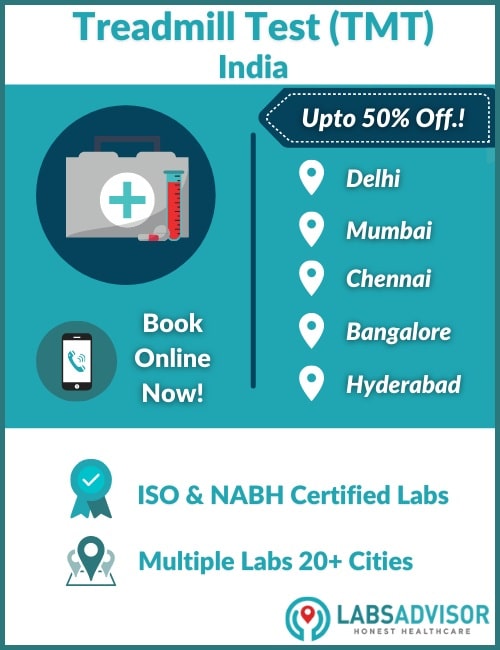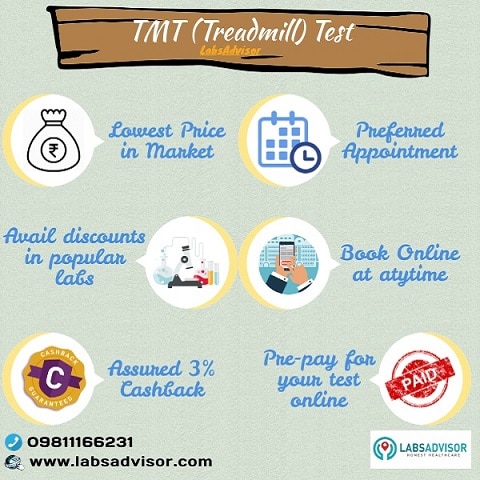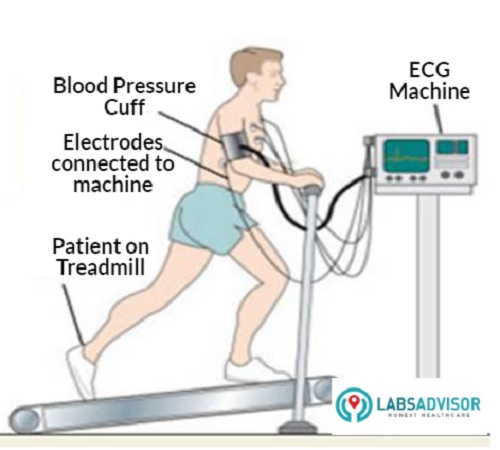
TMT Test or Treadmill test (also called the Cardiac stress test) is done to evaluate how your heart responds when you are made to exercise in a controlled environment.
Book your TMT test at highly rated labs like SRL and Apollo or at your local top-quality labs through us at up to 50% discount. The lowest TMT test cost is ₹500 only.
TMT Test in India Through LabsAdvisor
|
Book Stress test online yourself at any time of the day or night by clicking on the appropriate link in the table below.
TMT Test Price in India and Lab Details
We offer the TMT test in over 20 Indian cities. Click on the link of your city below to choose a lab and make an online booking for home collection at a suitable time.
| Treadmill Test Price in India | Price Starting From |
| TMT Test Cost in Delhi | ₹1275 |
| TMT Test Cost in Gurgaon | ₹1450 |
| TMT Test Cost in Mumbai | ₹1620 |
| TMT Test Cost in Bangalore | ₹800 |
| TMT Test Cost in Chennai | ₹1275 |
| TMT Test Cost in Hyderabad | ₹500 |
| TMT Test Cost in Noida | ₹1275 |
| TMT Test Cost in Kolkata | ₹855 |
| TMT Test Cost in Pune | ₹1500 |
| TMT Test Cost in Other Cities of India | ₹500 |
If your city is not listed in the table above, call us on +918061970525. We will get back to you with the price of a TMT test cost near you.
Call us to know the lowest cost of the TMT test in India
If you want us to call you back, click on the link below:

Purpose of Treadmill Test (TMT)
The treadmill test or TMT test determines the effect of physical stress on your heart. It is done to see how well your heart responds when you are made to exercise in a controlled environment. It is performed in OPD so there is no need for hospitalization for the test.
Patient exercises on a treadmill under the supervision of a physician and his/her ECG are monitored continuously. In addition, blood pressure and other symptoms are also monitored. ECG changes detected during stress tests can lead to the diagnosis of Coronary Artery Disease (CAD).
Coronary Artery Disease (CAD) is the most common type of heart disease affecting millions in India. It can lead to angina and heart attack. It is the leading cause of death in India for both men and women. TMT is a safe and cost-effective test that indicates the presence of the disease.
When is TMT Test prescribed?
TMT is primarily used to check if your heart receives optimum oxygen and blood circulation when it needs the most i.e. when you are exercising.
TMT Test is generally is advised to you if:
- You experience chest pain, fatigue, or breathlessness while walking or running. These symptoms can be coronary heart disease.
- You have suffered a heart attack. The study will determine your heart condition and confirm that your heart is in a stable state, or that a new blockage is developing.
- Even if you show up with no symptoms of heart disease but have a family history of the disease, you will be advised to undergo a TMT test.
- You are a chain smoker.
- You are over the age of 40.
- If you plan to start a rigorous exercise workout program. TMT will be advised to assess your heart for exercise tolerance.
Preparation for TMT Test
Before undergoing a TMT test, you should tell your doctor in advance if you
- Get chest pains and shortness of breath while walking or running.
- Have stiff joints from arthritis.
- Have exercise-induced Asthma. I.e. you get wheezing or cough while exercising. Your doctor will advise accordingly.
The following are the recommendations to follow on the day of the test:
- Do not eat or drink for three hours prior to the procedure. This reduces the chances of nausea that may happen due to strenuous exercise after a heavy meal.
- Specific heart medicines may need to be stopped one or two days before the test. Such instructions are generally provided when you are scheduled for the test.
- Wear comfortable clothes and shoes that are suitable for exercise.
- Information regarding the test will be given to you to read and you may be asked to sign a consent form.
- You should keep approximately one hour for the entire test, including the preparation.
The procedure of the TMT Test
For a regular stress test, the equipment used is a treadmill, though in some labs the stress test is conducted using a stationary bicycle. This equipment also has connections to the ECG monitor and a paper recorder, as well as a blood pressure cuff. Though the dangers of cardiac arrest during TMT tests are extremely low, as the test is conducted on patients who are suspected to have a heart condition, almost all labs are ready with emergency medication and support.
A stress test generally takes up to 60 minutes from beginning to end. The actual exercising part of the test takes only 20 minutes. You will be brought to the test room where the technician or nurse will record your heart rate and blood pressure at rest. She will then place sticky patches that are the electrodes on your chest.
These patches are attached to wires that carry the electrical activity of the heart to the monitor and recorder of the ECG machine. Before the start of the test, the ECG will record your heart activity on paper. This is what is known as the Resting ECG. More recordings will be made during the test when you are exercising on the treadmill.

The treadmill is switched on at a slow, also called ‘warm-up’ speed, and gradually the incline of the treadmill is increased. This is a pre-set program, which regulates the speed and incline of the treadmill over time intervals. Every three-minute interval is called a stage. During the test, your blood pressure will be recorded at every stage, but the recordings can be done more frequently if necessary.
Measurements taken during and immediately after the workout are indicators of cardiovascular fitness and how well your autonomic nervous system is functioning: how long you can continue at the treadmill’s speed and incline gradually increase; whether your blood pressure drops instead of rising; whether the heart rate increases to a level appropriate for your age and how fast it recovers when the test ends; and whether the pumping chambers of the heart develop any abnormal beats.
Your ECG is recorded both on paper and on the monitor. If you develop any sort of uneasiness, the test could be stopped before the target heart rate is achieved. Otherwise once the test has been completed, the treadmill speed and incline are gradually decreased to cool you down and then finally stopped.
You may feel a little bit tired after the test but that is normal as body muscles were put to strenuous work.
Are there any risks?
The risk of the test is minimal with only one out of a thousand patients experience problems and may require hospitalization. There is a small danger of the patient suffering a heart attack during the stress test. However, the experienced medical staff is present to manage these rare complications.
What are the limitations of the test?
When the stress test is used for people who are at low risk for heart disease, an abnormal ECG is most often a false positive. A false-positive result may call for further testing that is far more costly.
Duration on the treadmill may be less due to lack of physical fitness, back problems or other unrelated disorders and hence treadmill test is not applicable for people with such conditions. When a middle-aged inactive person is done in after only three minutes on the treadmill, it may be due to his sedentary lifestyle instead of heart disease.
The efficacy of TMT is limited in determining heart conditions like atherosclerosis, which is a condition involving the thickening of the walls of the arteries. It also cannot identify Atheroma or vulnerable plaques.
TMT Test Pros & Cons
The Tread Mill Test’s main advantages are its rapidity and low cost. It takes one-fifth of the time taken by the tests like a nuclear stress test, CT coronary angiogram or standard angiogram and is much cheaper also.
To conclude, the exercise TMT Test gives information regarding the presence or absence of ischemia in suspected obstructive CAD either in the general population or in special situations. It also gives a wealth of information about other cardiovascular diseases. It is cost-effective and very safe.
In Spite of pitfalls and limitations, TMT Testing still remains the most useful test because of its wide availability, reasonable cost, minimal risk, and easy interpretation of results.
Other topics you may be interested in:-
- CT Coronary Angiography Cost in Delhi
- ECG Test Price in India
- Coronary Calcium Scan Cost in India
- Echo Test Price in India






